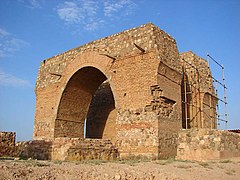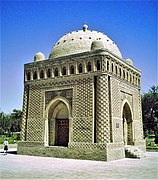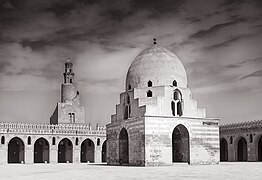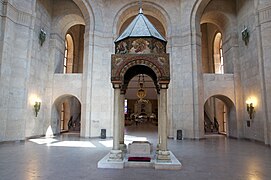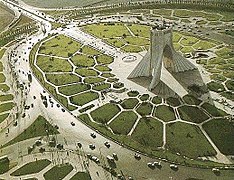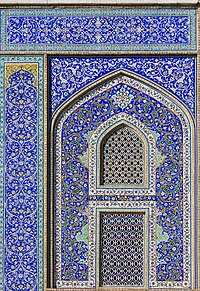Chahartaq (architecture)
 From Wikipedia the free encyclopedia
From Wikipedia the free encyclopedia
This article needs additional citations for verification. (January 2019) |
Chartaq (Persian: چارطاق), chahartaq (چهارطاق), chartaqi (چارطاقی), or chahartaqi (چهارطاقی),[1] literally meaning "having four arches", is an architectural unit consisted of four barrel vaults and a dome.
History
[edit]Chartaqi was a prominent element in Iranian architecture, having various functions and used in both secular and religious contexts for 1,500 years, with the first instance apparently being developed in the Sasanian city of Gor (Firuzabad) in 210s AD by King Ardashir I. The biggest instance of chahartaq is that of the so-called Palace of Shapur I at Bishapur, also in Pars. Many pre-Islamic chahartaqs have survived, but they are usually just the sole surviving structure of a much bigger complex. The chahartaq structure was adopted in Islamic architecture.[2]
A related concept is čahārqāpū (چهارقاپو).[2]
- Baze Hoor fire temple, Arsacid period
- Chahartaqi of the Zahhak Castle, Arsacid period
- Chartaqi of Neyasar at Neyasar, Kashan, Iran. Late Arsacid
or early Sassanian era. It is one of the few intact chartaqis. - Chahartaqi of Kheirabad, Sassanian period
- Chahartaq in Sarab, East Azerbaijan Province. Sassanian period
- Ateshgah of Baku. Many pre-Islamic chartaqis were part of a fire temple
- Chartaqi of Karchan
- Chahartaqi of Konarsiyah
- Chartaq on top of the Harpak fire temple in Abyaneh
- A chahartaq as a small mausoleum, with a grave inside, near Isfahan, 1840 drawing by Eugène Flandin
- Sabil ablution fountain at Mosque of Ibn Tulun, Cairo, Egypt
- Tomb of Ali Barid Ali barid Shah, Bidar, India
- "Kiosk-mosque" at Sultan Han caravanserai, Turkey (Seljuq period) (see also Tetrapylon)
- Saint Gregory the Illuminator Cathedral, Yerevan, Armenia
Contemporary architecture
[edit]The main plan of the post-modern Azadi Tower in Tehran is said to be influenced by the architecture of chartaqis.[3][4]
- Azadi Tower
- Monument of Molla Hossein Kashefi, Sabzevar, built in 1974.
The post-modern design has incorporated the concepts
of chahartaqi and iwans. - Scholars Pavilion (the Scholars Chartagi) in Vienna, a
chahartaqi with elements from the architecture of Persepolis - A sample of modern Islamic architecture - The mosque of international conferences center - Isfahan
See also
[edit]References
[edit]- ^ Also transliterated with gh instead of q.
- ^ a b Dietrich Huff, "ČAHĀRṬĀQ", Encyclopaedia Iranica, December 15, 1990
- ^ "بنیادفرهنگی هنری رودکی". Bonyadroudaki.com. Retrieved 20 April 2018.
- ^ "Freedom Tower, the gateway to Iranian civilization and art". Chidaneh.com. Retrieved 28 January 2019.







